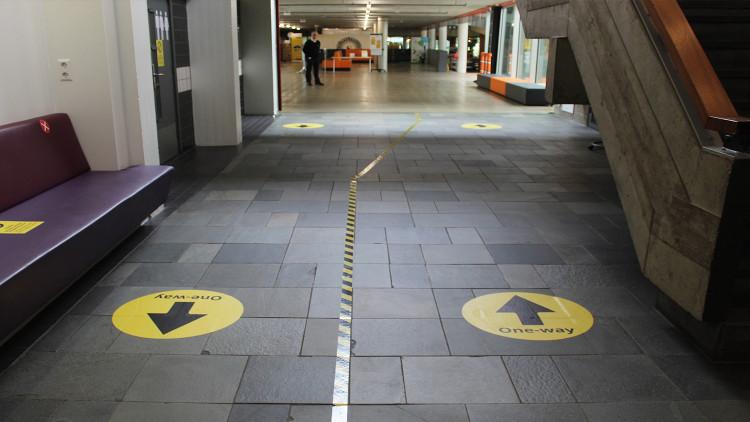Covid: no more social distancing, but at what price?

From August 30, higher education students will no longer have to observe social distancing, Prime Minister Mark Rutte announced last Friday during the government’s latest press conference about the coronavirus pandemic. That's three weeks earlier than recommended by experts.
But the brakes are not being released entirely. Face masks will still be mandatory in corridors and hallways, and no more than 75 students will be allowed to gather in lecture halls. In addition, higher education institutions will have to keep their buildings well ventilated, in addition to establishing clear walking routes so as to avoid crowding.
The cabinet also expects students to get tested with a home kit twice a week and stay home if they do not feel well. The hand sanitising stations are not going anywhere either.
Who's welcoming the measure?
The announcement is a “huge relief for everyone”, tweeted Pieter Duisenberg, president of the Association of Dutch Universities (VSNU). Maurice Limmen, of the Association of Universities of Applied Sciences, echoed the sentiment, saying the relaxations are “of great importance”.
Mirjam van Praag, chairperson of Vrije Universiteit Amsterdam, appeared on talk show Op1 to talk about the end of social distancing. “Everyone is delighted”, she declared. “I actually got tears in my eyes.” On the same broadcast, Ama Boahene, chair of national student organisation LSVb, stated that she too is “very happy” that social distancing will no longer be required in higher education. “It simply had to happen, there was no alternative.”
Was there no criticism at all?
They were annoyed by the decision to restrict the amount of students allowed in lecture halls to 75. “I don’t understand where that number comes from”, said Boahene. "Some lecture halls are big enough to accommodate more students safely", she suggested. Van Praag nodded.
Isn’t it too risky to relax the rules now?
Yes, there are risks. Virologist Ab Osterhaus, also a guest on Op1, expressed his concerns, noting that strong criticism is being voiced elsewhere too. The higher education sector will become a “fast track for the virus”, predicted John Grin, professor of Political Science at UvA, in the Dutch newspaper De Volkskrant. Philosopher Jeroen de Ridder, of The Young Academy, is also afraid that the virus might flare up again.
Not all students have welcomed the relaxations, either. Of the 700 students polled by TV show EenVandaag, only half are in favour of the relaxations, while 39 percent consider the reopening a bad idea. Some young adults cannot get vaccinated because of auto-immune diseases or other health issues, and they're in a state of a panic, reports newspaper Het Parool.
Cold feet?
The critics feel that the Outbreak Management Team (OMT), the team of experts advising the government on the pandemic, is on their side, as they recommended not to introduce the relaxations before September 20. The OMT predicts clusters of infections “and consequent unrest” if social distancing rules are scrapped earlier.
Why does the OMT think that?
Many students have gone abroad on vacation and could be bringing the virus back to the Netherlands with them. Besides, not everyone who wants to get vaccinated has gotten their second jab yet. Therefore, the OMT advises to keep restrictions in place at the start of the academic year.
The Municipal Health Services (GGD in the Dutch acronym) feels the same. “We're still thinking about the experience of lifting restrictions prematurely at the end of June", says André Rouvoet, chairman of the GGDs' umbrella organisation. In June, the sudden end of several measures to contain the pandemic led to an explosive increase in the number of infections.
Why is the cabinet ignoring the OMT's advice?
Scheduling was the decisive factor. “It is simply unfeasible for educational institutions to make a schedule that will become redundant in the middle of the first term”, Rutte explained, "postponing the relaxations for a few weeks would therefore mean another term without classes on campus for more than a million young people.”
Was it really impossible to wait a bit longer?
Over a million higher education students have been studying predominantly online for a year and a half “and the consequences are significant”, Rutte stated on Friday, referring to the mental health problems among this group.
What if universities demanded students to show a negative Covid-19 test?
That is out of the question at this point. Universal access to education is such an important principle among Dutch politicians that there is little support for the idea in the parliament. Students are being offered free self-test kits, but it's up to them to decide whether they'll take them or not. That's as far as MPs are willing to go, so mandatory vaccination is even more unlikely.
How many students have been vaccinated as of yet?
About 64 percent of those aged 18 to 25 have gotten their first jab, according to the National Institute for Public Health and the Environment (RIVM). Other figures show that more than 80 percent of those aged 16 to 24 are willing to be vaccinated, and that percentage is increasing.
Nevertheless, few students are taking self-tests
The cabinet ignored this problem and the House of Representatives didn’t do much about it either. But now there's a special Covid legislation paving the way for higher education institutions to demand proof of a negative Covid test, should the situation so require. If need be, this rule can be put in place rather quickly.
What about the introduction weeks?
Most introduction weeks take place prior to the start of the new academic year, so the current restrictions are still applicable for those events.